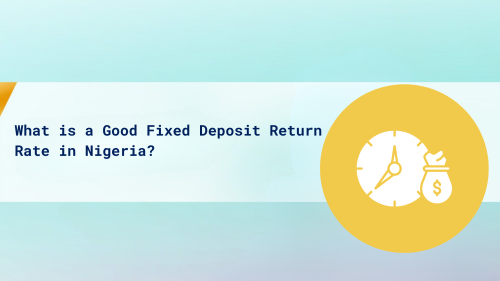
What Are My Fixed Deposit Return Rate Options in Nigeria?
Fixed deposits, also known as FDs, have become an extremely popular kind of investment in Nigeria. These deposits give investors the potential to grow their savings over time by taking advantage of the competitive interest rates offered by the numerous financial institutions that offer them. We will discuss a number of significant factors that have an impact on FD pricing. Additionally, we will discuss where investors may receive current rates, as well as what a good rate might look like depending on the conditions that are now present in the market. In this article, we will also investigate the sources from which investors can receive the most recent foreign exchange (FD) rates in Nigeria, as well as explain what constitutes an “ideal” or ideal interest rate, taking into account the current circumstances in Nigeria.
Factors Influencing FD Rates in Nigeria
A variety of factors affect the rates of interest offered for fixed deposits in Nigeria, including:
Central Bank of Nigeria (CBN) Policies
The rates of monetary policy that it implements, such as the Monetary Policy Rate (MPR), play a significant part in the process of determining the interest rates that are applied to fixed deposits.It is common practice for banks and other financial institutions to adjust their interest rates in response to changes in the MPR. This rate acts as an indicator for borrowing money and the costs associated with borrowing money.
Economic Conditions and Inflation
The general economic situation in Nigeria, which includes inflation rates, is also a factor in FD rates of interest. In times of high inflation, banks might offer greater rates in order to draw depositors and preserve the true worth of their investment. In contrast, in times of lower inflation or recession, FD rates may decline.
Financial Institution
Rates of interest can differ between microfinance banks, commercial banks, and different financial establishments. Banks with good reputations and a solid financial situation may provide less expensive rates compared to smaller banks or non-bank financial firms (NBFCs), which have a greater zeal for securing deposits.
Investment Amount and Tenure
The sum you put into the account as well as the length of your FD are often the determinants of the rate that is offered. The general rule is that higher amounts and longer terms yield better rates since banks are able to be sure that the money will remain untapped for a longer period.
Where to Find the Latest Nigerian FD Rates
To keep up to date with the most recent FD rates for Nigeria, it is possible to refer to these sources:
Bank Websites
Many commercial banks as well as financial institutions located in Nigeria have sections dedicated to their official websites that showcase the latest rates on FD interest. It’s recommended that you check these sites regularly in order to compare rates between many institutions.
Online Comparison Platforms
Numerous websites, including FinancialExpert.NG offer comprehensive comparisons of rates for FDs from different banks across Nigeria. They allow you to sort rates compatible with your budget, duration, and other criteria.
Financial News Sources
The most reputable publications, such as FinancialExpert NG, Nairametrics, Punch, and BusinessDay, frequently track and offer additional reports on the changes in the interest rate, offering important insight into how to navigate the Nigerian finance market.
Understanding a “Good” Rate in Nigeria
What is the “good” FD rate in Nigeria? It is a matter of evaluating several aspects:
Historical Trends
To assess the appeal of rates at present and the attractiveness of current rates, you should take a look back at the historical patterns in FD rates within Nigeria. In the past, rates have fluctuated substantially due to CBN policies as well as economic conditions. Being aware of these fluctuations could provide an important context for evaluating present offers.
Benchmarking Against Inflation
The “good” FD rate should be at least higher than the current rates of inflation in Nigeria. It ensures that the investments yield a real-time positive return while safeguarding your savings’ buying capacity over time.
Individual Needs
What is a “good” rate depends on the goals of your financial situation and your risk tolerance. If your primary goal is protection of your capital, a lower but steady rate could be more appropriate. If maximising returns is what you’re after, you might be willing to accept a little more risk with higher rates.
Tips for Maximising FD Returns
To assure that you’re receiving the perfect potential returns from the fixed deposit you have in Nigeria, take a look at these suggestions:
Shop Around
Do not settle for the initial FD rate you find. It is important to research rates between diverse financial institutions and banks for the most affordable rates.
Take a look at smaller banks or NBFCs
Although larger commercial banks provide convenience and security, small banks or financial institutions that are not banks (NBFCs) might impart higher rates for FDs in order to lure clients.
Look for Promotional Offers
A few banks will occasionally conduct promotions that offer higher initial rates for FDs for a short period of time. Be on the lookout for promotions like this However, ensure that you know the conditions and terms.
Stagger Investments Instead of putting all of your money in one FD, think about increasing your portfolio through the opening of diverse FDs that have different terms. This approach could help in providing more potential for flexibility as well as the chance to invest at greater rates when every FD is ageing.
Additional Considerations
The Nigeria Deposit Insurance Corporation (NDIC) is authorised to insure deposits held by commercial banks in Nigeria up to an agreed-upon sum, usually representing their fixed deposits held with commercial banks within Nigeria. In order to provide you with additional guarantee for the investment, you should check that the balance of your FD is within the limit of insurance.
Implications for Taxes
Generally speaking, the interest that is earned from fixed deposits in Nigeria is subject to withholding tax. When you are calculating the effective returns on your fixed-income investment, it is absolutely necessary to take into account these tax implications.Final Thoughts
To find a dependable fixed return on your deposit in Nigeria, you will need to conduct an in-depth review of a number of different factors, including the policies of the Central Bank of Nigeria (CBN), the economic conditions, the bank’s offerings, and your own personal financial goals. It will be possible for you to maximise the return on your FDICs if you are aware of the most recent rates and compare them to other tactics, such as investing in ladders.
It is imperative that you give priority to protection from insurance and security while simultaneously searching for rates that are competitive in order to achieve the optimal balance of returns and risk that you should strive for.

Leave a Reply